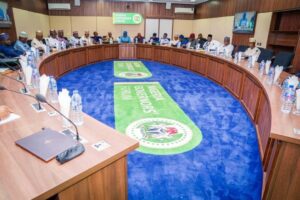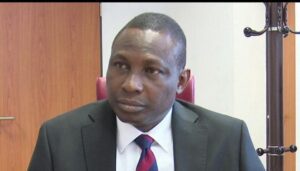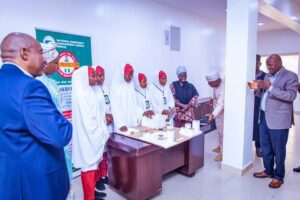


N80.2bn fraud: EFCC opens up on why Yahaya Bello is shying away from trial
…As trial Judge orders substituted service through counsel
…Commission reveals discovery of new fraudulent scheme, P to P
Stories by Adeyanju Esther
Justice Emeka Nwite of the Federal High Court, Maitama, Abuja has ruled that former governor of Kogi state, Yahaya Bello should be served summons through his counsel, Abdulwahab Muhammad (SAN), after he failed to appear in court again on Tuesday to answer to charges of N80.2 billion fraud.
The charges brought by the Economic Financial Crimes Commission, EFCC implicated Yahaya Bello, Ali Bello, Dauda Suleiman, and Abdulsalam Hudu on 19 counts charges related to money laundering, amounting to a staggering N80,246,470,089.88k.
During the court proceedings, Bello’s counsel, Adeola Adedipe (SAN), sought to quash the arrest warrant issued against his client, arguing that the substituted service to the defendant through his counsel invalidated the warrant. Adedipe emphasized the importance of ensuring justice prevails throughout the legal process.
However, the prosecution counsel, Kemi Piniero (SAN), countered Adedipe’s argument, stressing the necessity for Bello’s physical presence in court for arraignment in a criminal matter of such magnitude. Piniero underscored the seriousness of the allegations, emphasising the need for Bello to personally appear and take his plea.
Following deliberation, Justice Nwite adjourned ruling on the defence’s application to revoke the arrest warrant until May 10, 2024, as the legal battle surrounding the alleged fraud case continues to unfold.
In a related development the Executive Chairman of the Economic and Financial Crimes Commission (EFCC), Ola Olukoyede, has proffered reasons why Bello does not want to comply with the commissions summons for interrogation.
Speaking at a press conference held at the EFCC’s Corporate Headquarters in Abuja on Tuesday, April 23, Olukoyede recounted his personal efforts to extend an invitation to Bello, highlighting the former governor’s reluctance to participate in the investigative process.
“Despite multiple attempts to persuade Bello to appear for interrogation, he adamantly declined, citing concerns over potential embarrassment.”
In a telephone conversation with Bello, Olukoyede said the former governor expressed apprehension about facing over 100 journalists allegedly stationed outside the EFCC premises, purportedly to intimidate him.
Undeterred by Bello’s apprehensions, Olukoyede said he proposed an alternative arrangement, offering to conduct the interrogation himself within the confines of his office. This, he believed, would ensure a discreet and impartial process. However, Bello remained adamant, suggesting that investigators travel to his village for the questioning—a proposal that would have posed logistical challenges and potentially compromised the integrity of the investigation.
The EFCC Chairman expressed deep concern over the reported instances of financial misconduct involving Bello, particularly highlighting the diversion of government funds to a bureau de change for the advance payment of his children’s school fees. This brazen misuse of public resources underscores the gravity of the allegations leveled against the former governor and raises questions about accountability and transparency in Nigeria’s political sphere.
In addition to shedding light on Bello’s refusal to cooperate with the EFCC’s investigation, Olukoyede revealed the discovery of a new fraudulent scheme known as P to P (peer to peer) trading. Operating outside the official banking and financial corridors. This illicit platform poses a significant threat to the stability of the foreign exchange market. In response, the EFCC has taken swift action, freezing over 300 associated accounts linked to this nefarious activity.
Despite the challenges encountered in holding individuals accountable for financial crimes, Olukoyede reaffirmed the EFCC’s unwavering commitment to Nigeria’s economic growth and development. He highlighted the commission’s significant successes in recovering stolen assets and securing convictions against fraudsters, underscoring the pivotal role played by the EFCC in safeguarding the nation’s financial integrity.
In a passionate appeal to Nigerians, Olukoyede called for increased support and cooperation with the EFCC, stressing that the commission’s mandate is not just about combating corruption—it’s about fostering a culture of accountability and transparency that is essential for Nigeria’s progress and prosperity.
He urged patriotic citizens to recognise their stake in the nation’s wellbeing and to stand united in the fight against financial crimes, affirming that supporting the EFCC is synonymous with working for the growth and development of Nigeria.



